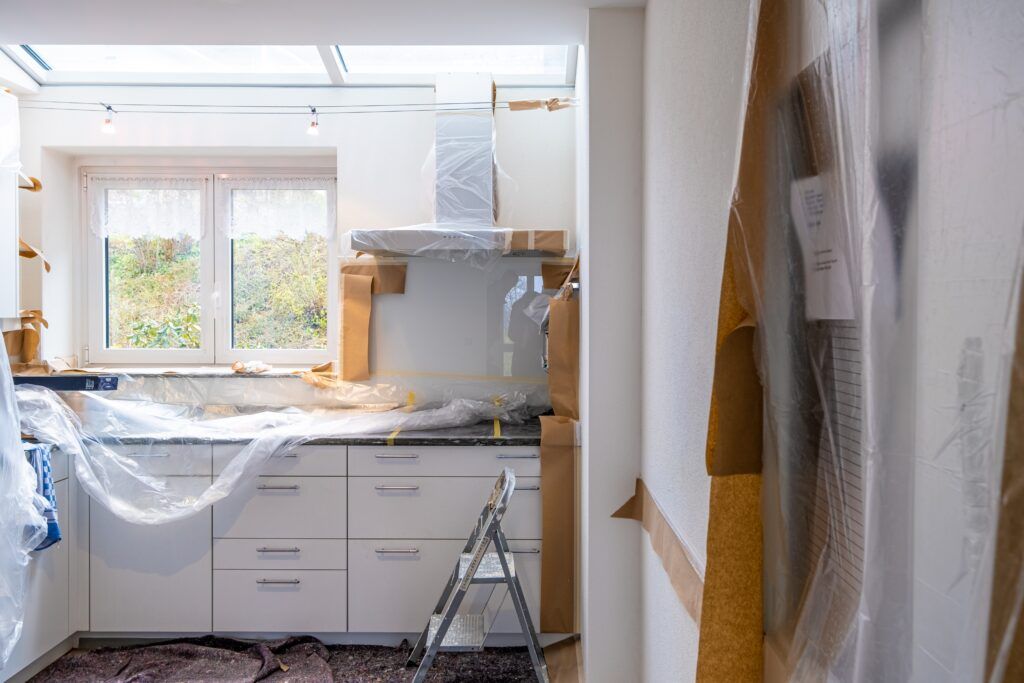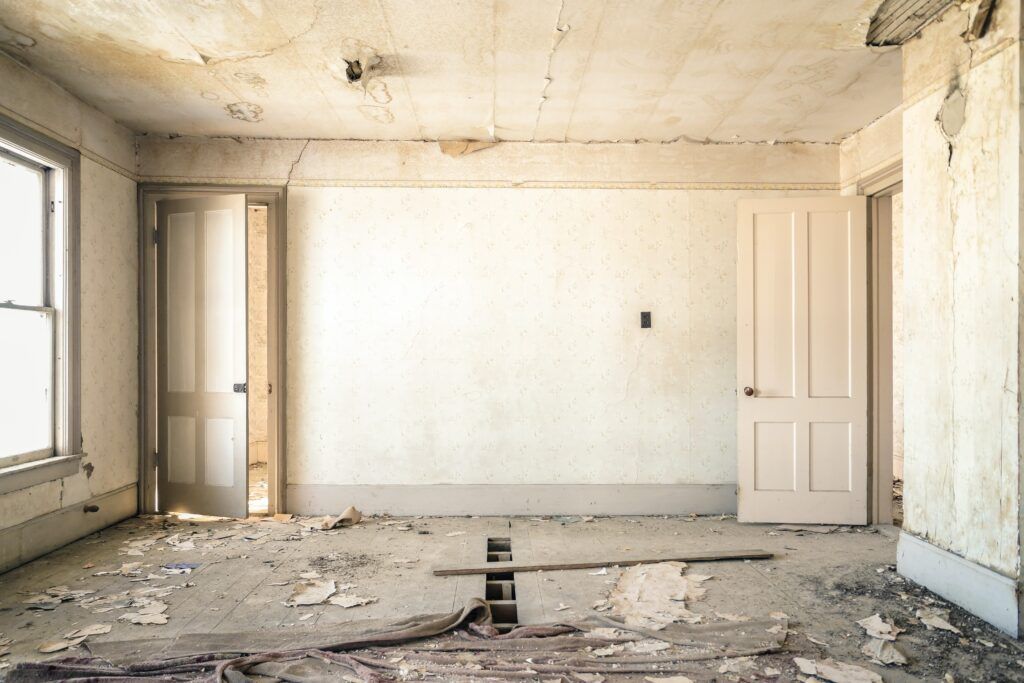Click here to browse our Real Estate Agent Directory and contact top-rated agents in your area!
Buying a fixer-upper can be a great way to save money in the long run if you plan it right. You could make a wise investment by purchasing a home with built-in equity in a great neighborhood. But is buying a fixer-upper worth it? There are several things to consider before you make a move. Let’s tackle those considerations one by one to learn how to buy and renovate a house and how to do it properly for less stress and maximum return on investment.
Why Buying a House That Needs Renovations Could be Smart
Benefits of Buying a Fixer-Upper
Buying a house that needs renovations could be a smart decision depending on a few factors, such as the price you pay versus the value of the house, whether or not you can do some of the work yourself, and whether the repairs needed are going to cost more than the discount you get from buying a fixer-upper.
Some reasons to buy a fixer-upper include:
- A house that needs work can be purchased at a massive discount.
- If renovations are done intelligently, the house’s value can significantly increase.
- You can find a house in a great neighborhood for a lower budget.
- Your new house can be customized exactly how you want it.
These are just a few benefits of buying a fixer-upper. There may be additional benefits depending on your specific situation. For example, if you or your partner are handy and can do some work yourselves, you can save thousands of dollars.

Before purchasing any house, be sure to make preparations, such as building up your credit score and getting approved for a home loan. Also, make sure to find the right real estate agent to help you on your home-buying journey.
Move-In Houses Cost More
Move-in ready houses, also known as turnkey houses, are houses that don’t need any work completed by the home buyer. This means the house is either newly constructed or the seller has put money into any repairs or renovations and may pass those costs onto the buyer. In the case of new construction, the house may also have expensive appliances or features, such as an advanced smart home HVAC system, that increase the purchase price. Whether the house is newly constructed or newly renovated, a turnkey house is likely to cost more than a house requiring some work.
Potential for Better Neighborhoods
Thanks to the potential for a steep discount, a fixer-upper may allow someone with a lower budget to buy into a better neighborhood than if they had bought a turnkey house for that price in a different area.
“Location, location, location” is still a hard truth in real estate, but the discount on a fixer-upper will depend on trends in your local area. In some areas, a fixer-upper can be up to 25% lower than the average list price of turnkey houses. In other areas, you may expect only a percentage point discount for a house that needs expensive repairs.
Do due diligence on your area. Whether or not buying a fixer-upper makes financial sense will depend on how much money it saves you compared to a turnkey purchase. You’ll also want to look into the price of the renovations. You don’t want to buy a fixer-upper, thinking you got a good deal, only to find that the cost of the renovations plus the home price exceeds what you would have paid in the same area for a turnkey house.
Lower Property Taxes
In most areas, property taxes are calculated and assessed based on the property’s market value rather than the house’s purchase price. Therefore, even if you buy a house at a severely distressed price, you will still need to pay more property tax.
Beware of the pitfall of thinking you’ll save on property taxes by buying a heavily discounted house. Property taxes may also go up considerably when the taxes are reassessed based on the improvements made to the house.
Planning Renovations in a Smart Way
Be Realistic about Your Skills
Only some people will be able to swing a hammer like a pro, even if it looks easy on TV and in videos. If there is repair work that you need to be qualified to do, such as electrical or plumbing work, you will need to hire these projects out.
>> AGENT ANSWERS: If I buy a fixer upper where can i get money to renovate?
The same is true for any other type of work you feel you cannot perform, such as foundation work, carpentry, painting, flooring, or any other type of repair work. Roofing is another example of dangerous work that you may only be able to safely perform with qualifications and experience. These are all areas that are best left to professionals.
If you do work that you need to be more skilled to do to try to save money, you may end up costing yourself more in the long run. For example, if you have to pay someone to come in and repair your mistakes, you could pay a professional to do the work from the beginning.
You’ll be Renovating Anyways
No matter what kind of house you purchase, you’ll be doing some renovations and maintenance at some point. So is it better to buy a fixer-upper? The answer to that question may depend on whether you plan to complete the work yourself or hire a professional for needed renovations.
As a homeowner, you’ll be doing small repairs, installations, and maintenance on your home’s various systems, such as plumbing, electrical, and appliances. When you move in, you’ll want to paint the walls the colors you want and make minor adjustments around the house to make it feel like your own.
This is part of owning a home and taking care of it as a homeowner. If you think you can do larger projects and are ready for the hard work, consider buying a house that needs work.

Plan out Financing
Meticulous financial planning should always be part of the renovation planning stage. Your budget will need to cover labor, materials, and contingencies that you may not expect, such as starting renovations only to find that the materials are backlogged. You need to wait to finish the repairs.
When planning out financing, consider:
- What is the project’s total budget?
- How much of a return on investment will there be?
- For example, can you get a home loan for a house that needs major repairs?
- What are the estimates from several different contractors?
Banks may not want to lend to you if your potential house needs a lot of work, especially if the work costs exceed the house’s value. Once you own the home, you can get loans for home improvement, such as home equity loans and home equity lines of credit.
Prioritize Your Renovations
Once you get your new house, it’s natural to want to renovate everything immediately. However, you may need more than your budget to do everything you want to do. Therefore, you will have to prioritize your renovations.
When planning your renovations, think about which issues are the most pressing and which changes are the most important to you. Then, you can use these questions to help yourself prioritize your renovations:
- Is the house habitable? If the house has systems that aren’t functional, such as the plumbing, they will need to be prioritized.
- Does the house have functioning drainage, water piping, hot water, heating, air conditioning, and ventilation?
- Will you need a licensed electrician to ensure the wiring is safe and up to code and that your electrical system can handle the electrical load?
- Are there leaks and water penetration?
- Does the house need new siding, gutters, or a new roof?
- Is there sufficient insulation to keep the house cool in the summer and warm in the winter?
- Are there serious issues with the foundation?
- Does the garage need to be finished or a deck repaired?
- Does the exterior need driveway repairs or landscaping updates?
>> AGENT ANSWERS: How to sell a fixer upper home?
Each of the items on your priority list will need to be budgeted. Some areas which need work but aren’t priorities may need to wait while other issues are addressed. After serious structural, plumbing, and electrical issues are repaired, you can consider aesthetic renovations.
Get Multiple Renovation Estimates
Your renovations are going to be handled, for the most part, by professional contractors. Therefore, you should go with a general contractor who takes charge of the entire project and subcontract each section of the project. Or you could take on the role of general contractor yourself and find subcontractors for each part of the project who will answer directly to you.
In most cases, you’ll probably want to get a professional general contractor if you don’t have experience in residential repairs and renovations. For this important job, you’ll want to ask around to find the best general contractor. You can get customer testimonials, look at online reviews, or use someone who was personally recommended to you by friends or family.
You should get estimates before selecting a subcontractor. Depending on the work, some subcontractors will give you a breakdown of labor and materials, while others may provide a flat estimate on the whole job. When you shop around, consider both the price and the workaround time that a contractor offers, and ensure you choose someone you can trust will get the job done properly.
Allocate a Contingency Fund
After you’ve created your budget and figured out what renovations will cost and how much time must be put into the repairs, add 5% to 10% to both the budget and time. The extra 5% to 10% is called a contingency fund. It will allow you to breathe easily when delays occur, or expenditures exceed the budget. You can always count on anything that can go wrong going wrong.
You can’t rely on a smooth supply chain these days, so materials are more likely to be delivered late, if at all. The price of materials could also go up between the budget planning phase and project dates. Estimates are not set in stone. Numerous unforeseen problems can arise during a project that may cause the final price to go up.
Having a contingency fund can help to take the shock out of expensive unforeseen events that cause delays or price increases.
Remember that Renovations are a Work in Progress
Owning a home is an investment of time, money, and work that you hope pays off in dividends in the future. Home renovations are always a work in progress; there is always something that could be done to modify, enhance, or update your home.
Is it worth buying a house that needs work? Houses are always in need of maintenance and care. Thus, homeowners will have to work on their houses or pay someone to do it for them. Buildings and all of the fixtures contained therein are in constant decay and need updating, repairs, and renovations to keep them in optimal condition. This is true whether you’re buying a cheap house and fixing it up or buying a house that doesn’t need work right away.
Consider the pros and cons of buying a fixer-upper as outlined above before buying a home that needs repairs. The benefits outweigh the risks with careful planning and execution.
Whether you’re buying a house that needs immediate renovations or one that may need renovation in the future, you will want an easy platform to help you find the right home. On FastExpert, you can easily find top local real estate agents for your home search or house sale assistance. Compare agents and read client reviews and testimonials to find the right agent for you.
- SEO Powered Content & PR Distribution. Get Amplified Today.
- Platoblockchain. Web3 Metaverse Intelligence. Knowledge Amplified. Access Here.
- Source: https://www.fastexpert.com/blog/is-buying-a-fixer-upper-worth-it/
- :is
- $UP
- a
- Able
- About
- above
- Additional
- adjustments
- advanced
- After
- Agent
- agents
- AIR
- Air Conditioning
- All
- always
- and
- Another
- answer
- answers
- appliances
- approved
- ARE
- AREA
- areas
- around
- AS
- assessed
- Assistance
- At
- average
- based
- BE
- before
- Beginning
- benefits
- BEST
- Better
- between
- bought
- Breakdown
- BREATHE
- budget
- budgeted
- Building
- built-in
- buy
- Buying
- by
- calculated
- called
- CAN
- Can Get
- cannot
- care
- careful
- case
- cases
- Cause
- Changes
- charge
- cheap
- Choose
- client
- code
- come
- compare
- compared
- complete
- Completed
- condition
- Cons
- Consider
- considerations
- constant
- construction
- contact
- Contractor
- contractors
- Cool
- Cost
- Costs
- could
- cover
- created
- credit
- customer
- customized
- Dangerous
- Dates
- Days
- deal
- decision
- delays
- delivered
- Depending
- different
- diligence
- directly
- Discount
- distressed
- dividends
- Doesn’t
- doing
- dollars
- Dont
- during
- each
- easily
- either
- ensure
- Entire
- equity
- especially
- estate
- estimate
- estimates
- Even
- events
- everything
- exactly
- example
- exceed
- exceeds
- execution
- expect
- expensive
- experience
- extra
- factors
- family
- Features
- few
- figured
- final
- financial
- financing
- Find
- finish
- flat
- For
- Foundation
- friends
- from
- functional
- functioning
- fund
- future
- garage
- General
- get
- getting
- Give
- Go
- going
- good
- great
- handle
- handy
- Hard
- hard work
- Have
- heavily
- help
- here
- hire
- Home
- hope
- HOT
- House
- houses
- How
- How To
- However
- http
- HTTPS
- hvac
- HVAC system
- i
- immediate
- immediately
- important
- improvements
- in
- In other
- include
- Increase
- Increases
- investment
- issues
- IT
- items
- Job
- journey
- jpg
- Keep
- Kind
- known
- labor
- larger
- Late
- Leaks
- LEARN
- LEND
- Licensed
- like
- likely
- lines
- List
- load
- loan
- Loans
- local
- location
- Long
- Look
- LOOKS
- Lot
- made
- maintenance
- major
- make
- MAKES
- Market
- massive
- materials
- Matter
- maximum
- means
- minor
- minor adjustments
- mistakes
- modify
- money
- more
- most
- move
- multiple
- Natural
- Need
- needed
- needs
- New
- New Construction
- numerous
- of
- Offers
- on
- ONE
- online
- optimal
- Other
- Others
- outlined
- own
- paid
- paint
- painting
- part
- partner
- Pay
- pays
- People
- percentage
- perform
- Personally
- phase
- PHP
- plan
- planning
- platform
- plato
- Plato Data Intelligence
- PlatoData
- Plumbing
- plus
- Point
- potential
- price
- Prioritize
- prioritized
- priority
- Pro
- probably
- problems
- professional
- professionals
- Progress
- project
- projects
- properly
- property
- PROS
- provide
- purchase
- purchased
- purchasing
- put
- qualifications
- qualified
- question
- Questions
- rather
- Read
- ready
- real
- real estate
- realistic
- reasons
- recommended
- repair
- residential
- return
- Reviews
- risks
- Role
- roof
- Run
- safe
- safely
- sale
- same
- Save
- score
- Search
- Section
- selecting
- sell
- sense
- serious
- set
- several
- Shop
- should
- significantly
- situation
- skilled
- small
- smart
- Smart home
- So
- some
- Someone
- something
- specific
- Stage
- Starting
- Still
- STONE
- stress
- structural
- such
- sufficient
- summer
- supply
- system
- Systems
- Take
- takes
- taking
- tax
- Taxes
- that
- The
- The Future
- their
- Them
- therefore
- therein
- These
- things
- Thinking
- thousands
- time
- to
- top
- Total
- Trends
- true
- Trust
- tv
- unforeseen
- Update
- Updates
- updating
- use
- value
- various
- Versus
- Videos
- wait
- warm
- Water
- Way..
- What
- whether
- which
- while
- WHO
- will
- Winter
- WISE
- with
- Work
- worth
- would
- Wrong
- Your
- yourself
- zephyrnet












